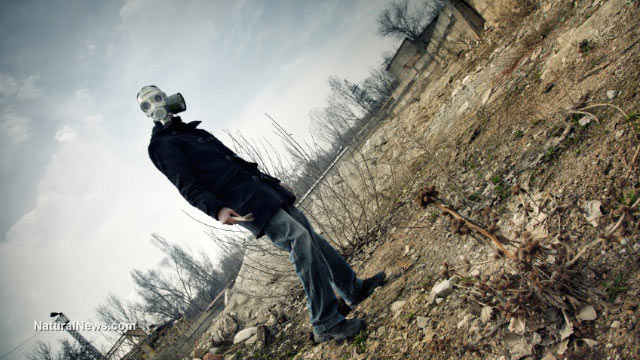Threat of global nuclear war now even higher than during the Cold War
Friday, March 20, 2015 by: J. D. Heyes
Tags: global nuclear war, Cold War, Russia

- Warp Speed 2.0: Trump Administration ACCELERATES Gates-funded, self-amplifying bird flu vaccines
- DMSO and Natural Dyes: A suppressed cancer treatment resurfaces in independent research
- Transhuman vectors of disease: Young adults continue to produce spike proteins ONE YEAR after receiving COVID vaccine
- Chemical cocktails in processed foods linked to diabetes, validating natural health warnings
- Study finds bananas more effective than salt reduction for lowering blood pressure
- 8 U.S. states may EXPAND vaccine exemptions in 2025, and parents have many reasons to STOP THE SHOTS
- Prominent doctors call for new holistic therapies to address CANCER SPIKE: Tree barks provide anti-cancer treatment options
- Aerosolized bioweapons? Strange “diploid biomasses” falling out of the sky in Florida captured under the microscope
- STAGING BEFORE RELEASE: WHO Runs 2-Day Pandemic Simulation 'Exercise Polaris'
- Fermented foods like sauerkraut may outshine modern medicine in gut health, research finds
- Ancient mummies rewrite human history with “ghost” lineage discovery
- Surge in KIDNEY FAILURES linked to common medications
- Fauci is back in the limelight, and he’s busy promoting a future COVID or FLU pandemic
- Mike Adams releases country western hit single: Goin’ Back in Time is Comin’ Home
- Millions of gun owners could be challenged in court and lose their firearms if DOJ doesn’t step in to stop crazy ATF rule
- Analysis: The coming economic collapse, a mass uprising and Trump's three secret weapons to halt the growing revolt
- Israeli lobbyists boast of controlling US national security policy in leaked AIPAC audio
- Widespread social and economic unrest: Steve Quayle issues urgent financial warning of imminent asset collapse in new interview with Mike Adams
- Israeli lobbyists boast of controlling US national security policy in leaked AIPAC audio
- Aerosolized bioweapons? Strange “diploid biomasses” falling out of the sky in Florida captured under the microscope
- Analysis: The coming economic collapse, a mass uprising and Trump's three secret weapons to halt the growing revolt
- Fauci is back in the limelight, and he’s busy promoting a future COVID or FLU pandemic
- Widespread social and economic unrest: Steve Quayle issues urgent financial warning of imminent asset collapse in new interview with Mike Adams
- Kiss Your Genetic Privacy Good-Bye! 23andMe Gets Green Light to Sell Your Intimate Genetic Details to Anyone They Want
- Mike Adams releases country western hit single: Goin’ Back in Time is Comin’ Home
- U.S. lawmakers investigate Meta over alleged China collaboration
- Tulsi Gabbard leads charge against the Biden regime’s global censorship of the 'Disinformation Dozen'
- Pfizer's RSV vaccine linked to preterm births as drug giant CONCEALED RISKS from pregnant women in unethical clinical trials
- Dane Wigington exposes climate engineering as ‘All-Out Weather and Biological Warfare’
- Shedding light on the dark side of MMR vaccines: How vaccinated individuals SPREAD MEASLES & put the vulnerable at risk
- TAKE IT DOWN Act advances in Congress amid free speech concerns
- CLOT SHOT PLANDEMIC UNFOLDING: Fibrous, rubbery clots caused by covid injections have prion-like seeding activity
- Chemtrails unveiled: How the CIA and Big Business are manipulating the weather for profit
- Curcumin’s ancient healing power supercharges muscle recovery, and its effects are compounded with anti-inflammatory foods and supplements
- Criminal referral requests filed against Fauci and top COVID officials in seven states
- Defunding DEADLY mRNA jabs: Government funding for mRNA technology being scrutinized and sidelined until proven "safe and effective" for real
- Newly released JFK files reveal Pentagon's role in creating Lyme disease and covid in the same lab
- Analysis: The coming economic collapse, a mass uprising and Trump's three secret weapons to halt the growing revolt
- Mike Adams releases country western hit single: Goin’ Back in Time is Comin’ Home
- Aerosolized bioweapons? Strange “diploid biomasses” falling out of the sky in Florida captured under the microscope
- Kiss Your Genetic Privacy Good-Bye! 23andMe Gets Green Light to Sell Your Intimate Genetic Details to Anyone They Want
- European Court of Justice: Healthcare professionals who promoted or administered COVID-19 vaccines are CRIMINALLY LIABLE for any harm caused
- Federal employees whine over DOGE's new directive requiring them to do a 5-point summary of weekly accomplishments
- Widespread social and economic unrest: Steve Quayle issues urgent financial warning of imminent asset collapse in new interview with Mike Adams
- U.S. approves new Russian ambassador as diplomatic thaw continues
- Government waste exposed: Hegseth supports Musk’s demand for accountability from federal workers
- Now you can HEAR chemistry: Health Ranger translates molecules into music in stunning video demonstration that will blow your mind (and your ears)
- Fauci is back in the limelight, and he’s busy promoting a future COVID or FLU pandemic
- CLOT SHOT PLANDEMIC UNFOLDING: Fibrous, rubbery clots caused by covid injections have prion-like seeding activity
- I Want My Bailout Money – new song released by Mike Adams
- I Want My Bailout Money – new song and music video released by Mike Adams
- Tulsi Gabbard leads charge against the Biden regime’s global censorship of the 'Disinformation Dozen'
- Trump administration poised to overhaul crypto regulations with new SEC leadership
- The Health Ranger releases “Vaccine Zombie” song and music video, using AI-animated zombies for the music video
- Red Cross issues warning to stop blood plasma donations from vaccinated people
- Scientists confirm: GENIUS brain function can be spontaneously unleashed in humans without any apparent cause
- EPA advisor admits the agency is funneling billions to climate groups ahead of Trump’s return to White House
- HYSSOP: What research reveals about the health benefits of this ancient holy herb
- Two containers with completed ballots fall out of truck in Florida
- Newly released JFK files reveal Pentagon's role in creating Lyme disease and covid in the same lab
- Global leaders unite to clamp down on “misinformation” with UN-backed Cascais Declaration
- Mike Adams releases country western hit single: Goin’ Back in Time is Comin’ Home
- BREAKING: 2025 NDAA authorizes mandatory military draft of WOMEN across America… as Pentagon pursues global NUCLEAR war with both Russia and China at the same time
- Michael Yon warns of a ZIONIST TAKEOVER in Trump’s second administration
- The Health Ranger releases “Vaccine Zombie” song and music video, using AI-animated zombies for the music video
- Ozempic and Wegovy weight loss drugs are injectable LIZARD VENOM PEPTIDES that may unleash a devastating wave of organ failure… side effects align with symptoms of SNAKE BITES
- BOMBSHELL: DNA testing kits are a SCAM to develop ethnic-specific bioweapons
- Israeli soldiers accused of even more torture and abuse in the West Bank
- I Want My Bailout Money – new song released by Mike Adams
- These 13 countries just signed an agreement to engineer a global FAMINE by destroying food supply
- NASA admits that climate change occurs because of changes in Earth’s solar orbit, and NOT because of SUVs and fossil fuels
- RFK Jr. clears key hurdle: Sen. Susan Collins backs controversial HHS nominee, signaling a new era for health policy
A confluence of events has brought renewed tension between the world's two biggest nuclear powers, the United States and Russia, and it is making a lot of Washington's allies -- especially those in Europe -- nervous.
Russia's "annexation" of Crimea and its sponsorship of a rebellion in one of its neighbors and former Soviet republics, Ukraine, has led to economic sanctions by the U.S. and the European Union, but that only seems to have emboldened Russian President Vladimir Putin. Russian bombers -- some with nuclear payloads -- have increasingly menaced European nations while repeatedly testing U.S. air defenses in recent months.
Also, Russian warships have been spotted near the United Kingdom while Russian navy submarines are boosting patrols U.S. coastal waters.
Widening divide
All of this renewed Cold War-era behavior between the historic rivals is taking its toll. Trust between Moscow and Washington appears to be growing, despite a pledge to "reset" U.S.-Russia relations by President Obama early in his first term. As noted by German magazine Der Spiegel, in its online editions:
In November 2014, the Russians announced that they would boycott the 2016 Nuclear Security Summit in the United States. In December, the US Congress voted, for the first time in 25 years, not to approve funding to safeguard nuclear materials in the Russian Federation. A few days later, the Russians terminated cooperation in almost all aspects of nuclear security. The two sides had cooperated successfully for almost two decades. But that is now a thing of the past.
In addition, both countries are boosting spending to modernize their nuclear arsenals, and the West's military alliance, NATO, is said to be rethinking its nuclear strategy as well.
Russia's proxy war in Ukraine, say geopolitical strategists, is a major reason why the West is recoiling.
"In Ukraine, more than 5,000 people have been killed, over 10,000 more have been wounded, and 1.2 million have been forced from their homes. If we do not stop the killing and address the mounting divisions in Europe, our generation may claim to have ended the Cold War yet still failed to secure a peaceful future," says a recently published paper by former British Defense Minister Des Browne, former Russian Foreign Minister Igor Ivanov, and former U.S. Sen. Sam Nunn, D-Ga.
At the conference, some European powers were quick to point the finger of blame at Putin's Russia. Norwegian Defense Minister Ine Marie Eriksen Soreide, for instance, said Russia's aggression should be defined as such, and unambiguously.
"It makes everything more dangerous"
"And it goes without saying that Article 5 of the NATO Treaty applies to such aggression," she pointed out, referencing to the provision of the agreement that requires all members to go to the defense of any member who is attacked.
"The Russian aggression is a direct threat to NATO," British Defense Secretary Michael Fallon seconded.
Officials at the conference alluded to a new form of "hybrid" warfare being utilized by Russia. Moscow has not officially sent uniformed troops into Ukraine but is believed to be providing the rebels there with arms and munitions, while engaging in cyber warfare and propaganda against the Ukrainian government. Many have claimed that Putin has secretly sent soldiers to fight in Ukraine, and he recently admitted to doing so in Crimea despite previous denials.
"It (hybrid warfare) makes everything more dangerous," Nunn said. "It makes tactical nuclear weapons more dangerous, and it makes weapons material more dangerous."
Der Spiegel reported that it was "common knowledge" that about 20 U.S. B61 nuclear bombs are stored at Buchel Air Base in the Eifel region of western Germany, and while the weapons are under U.S. control, "German Tornado fighter jets would drop the bombs in the event of a war."
Sources:
http://www.spiegel.de
http://www.irishexaminer.com
http://www.nytimes.com
http://freebeacon.com
http://www.mirror.co.uk
http://www.nytimes.com
http://www.project-syndicate.org
Global nuclear war at FETCH.news
Get independent news alerts on natural cures, food lab tests, cannabis medicine, science, robotics, drones, privacy and more.
Take Action: Support Natural News by linking to this article from your website
Permalink to this article:
Embed article link: (copy HTML code below):
Reprinting this article:
Non-commercial use OK, cite NaturalNews.com with clickable link.
Follow Natural News on Facebook, Twitter, Google Plus, and Pinterest
Science News & Studies
Medicine News and Information
Food News & Studies
Health News & Studies
Herbs News & Information
Pollution News & Studies
Cancer News & Studies
Climate News & Studies
Survival News & Information
Gear News & Information
News covering technology, stocks, hackers, and more



"Big Tech and mainstream media are constantly trying to silence the independent voices that dare to bring you the truth about toxic food ingredients, dangerous medications and the failed, fraudulent science of the profit-driven medical establishment.
Email is one of the best ways to make sure you stay informed, without the censorship of the tech giants (Google, Apple, Facebook, Twitter, YouTube, etc.). Stay informed and you'll even likely learn information that may help save your own life."
–The Health Ranger, Mike Adams













































